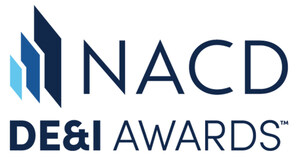Survey Finds Private Company Boards Lagging Behind on ESG
WASHINGTON, July 26, 2022 /PRNewswire/ -- The National Association of Corporate Directors (NACD), the authority on boardroom practices representing more than 23,000 board members, today released findings from its 2022 NACD Private Company Board Practices and Oversight Survey report.
Despite the conflict in Ukraine, a supply chain crunch, inflation, an ongoing pandemic, skepticism towards globalization, and other issues, the increased competition for talent remains the chief concern for private company directors, with 77 percent of survey respondents placing it among the five issues most likely to affect their company in the coming year.
By comparison, 69 percent of respondents in NACD's 2022 Public Company Board Practices and Oversight Survey, released in June, listed competition for talent as a top-five concern. Inflation is also a growing concern to private company directors, trending upward on respondents' lists for two years in a row.
"We're proud to share the results of our latest Board Practices and Oversight Survey for private companies, which provide tangible, real-time benefits to directors throughout the country," said NACD president and CEO Peter Gleason. "Beyond current trends and statistics, the report offers insights into board dynamics and other areas that are critical for boards to succeed in today's rapidly changing and often tumultuous business environment."
The results outlined below present an overview of boardroom activities and trends in several key areas—including ESG, climate change, cybersecurity, and more—and provide directors with pertinent information to help them meaningfully lead their boards in 2023 and beyond.
Other Key Trends from the 2022 Private Company Board Practices and Oversight Survey:
- ESG practices have not matured to the extent seen in public company boardrooms.
- Fourteen percent of private company respondents said their board has not focused on ESG issues in the past year, compared to just 3 percent of public company respondents.
- Cybersecurity threats are being met by boards adopting best practices in greater numbers.
- Sixty-eight percent of those surveyed have reviewed their company's approach to protecting data and 65 percent have reviewed the most significant cyber threats facing their company.
- Human capital oversight practices like talent development strategies and metrics reporting are increasing.
- A majority of boards are now discussing enterprise-wide talent development strategies (70%) and broader human capital strategies on a recurring basis (58%), but more work remains to catch up with public company boards in areas of advanced human capital practices like committee delegation and charter review.
- Board dynamics are improving, owing in part to better and more frequent reporting from management.
- Fifty-eight percent of respondents cited quality input from management as one of the key drivers of exceptional board performance.
- Climate discussions lack priority compared to public company boards.
- Only 30 percent of respondents indicated that climate-related discussions have increased in frequency among their boards (compared to 54% of public company boards). And 25 percent reported that climate change is not a concern for their company.
- DE&I practices have increased, but overall board understanding of issues has slowed.
- There is fairly wide adoption of DE&I oversight such as having management report key DE&I metrics to the board (59%) and discussing the organization's DE&I priorities (62%). Only a slim majority (51%) reported that their board's understanding of DE&I issues has significantly improved, compared to two years ago.
Read the full report released by NACD.
About the Survey Data Collection
Leveraging its proprietary member database as a sample frame, NACD sent email invitations to directors and others who serve on boards asking them to participate in the 2022 Board Practices & Oversight survey. The survey was in the field from March 28 to April 21, 2022, and the questionnaire was administered electronically. Respondents were instructed to respond on behalf of one of the boards on which they serve.
Analysis
Percentages are based on the total number of responses specific to each question. For example, if a question received responses from only 100 out of 168 total respondents, and 75 respondents answered "yes" while 25 answered "no," the result is reported as 75 percent affirmative. In some cases, survey responses totaling fewer than 5 percent are not represented in graphs for the sake of clarity.
About NACD
For more than 40 years, NACD has been on the leading edge of corporate governance, setting standards of excellence that have elevated board performance. NACD arms today's directors with insights and education that drive their mission forward, while preparing a new generation of boardroom leaders to meet tomorrow's biggest challenges. NACD is a community of more than 23,000 directors driven by a common purpose: to be trusted catalysts of economic opportunity and positive change—in businesses and in the communities they serve. To learn more about NACD, visit nacdonline.org.
Media Contacts:
Shannon Bernauer
[email protected]
(571) 367-3688
Susan Oliver
[email protected]
703-216-4078
SOURCE National Association of Corporate Directors

WANT YOUR COMPANY'S NEWS FEATURED ON PRNEWSWIRE.COM?
Newsrooms &
Influencers
Digital Media
Outlets
Journalists
Opted In





Share this article